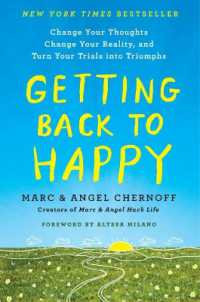- ホーム
- > 洋書
- > 英文書
- > History / World
Full Description
Recent devaluations of a liberal arts education call the formative concept of Bildung, a defining model of self-cultivation rooted in 18th and 19th century German philosophy and culture, into question and force us to reconsider what it once meant and now means to be an "educated" individual. This volume uses an arc of interdisciplinary scholarship to map both the epistemological origins and cultural expressions of the pivotal notion of Bildung at the heart of pursuit in the humanities. From its intriguing original historical manifestations to its continuing resonance in current ongoing debates surrounding the humanities, the editors urge us to ask and discover how the classical concept of Bildung, so central to humanistic inquiry, was historically imagined and applied in its original German context.
Contents
List of Illustrations
Acknowledgments
Introduction
Jennifer Ham, Ulrich Kinzel, and David Tse-chien Pan
Chapter 1. Self-cultivation and the Police State: The Political Context of Wilhelm von Humboldt's Concept of Bildung
Ulrich Kinzel
Chapter 2. Fichte's Conception of Bildung and German National Identity
David Tse-chien Pan
Chapter 3. Becoming Solid: Bildung and Storage Media in Moritz's and Goethe's Italian Travels
Sean Franzel
Chapter 4. Schinkel's Altes Museum as "Bildungsmuseum": The Aesthetic Education of a National Community and the Makings of the Modern Museum
Andrea Meyertholen
Chapter 5. From Bildungsmaschine to Willenserziehung: Nietzsche's Project of "Heroic Minds"
Jennifer Ham
Chapter 6. The Self-Formation of Poetic Expression: Wilhelm Dilthey's Geistesgeschichte
Anna Guillemin
Chapter 7. Bildung as Dialectical and Theological Hermeneutics in the Service of the Humanities
John Smith
Conclusion
Index








